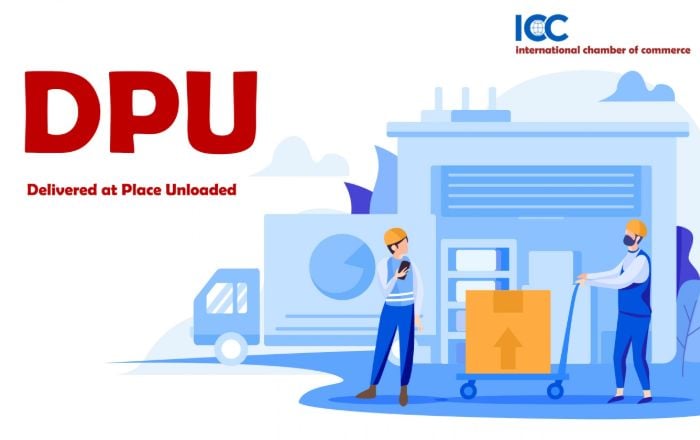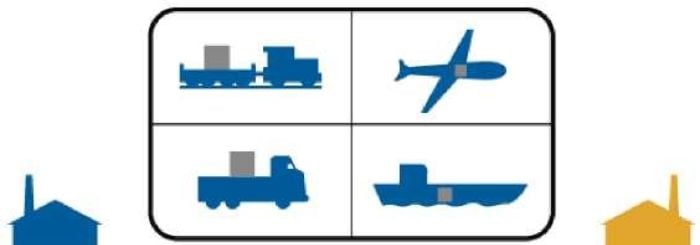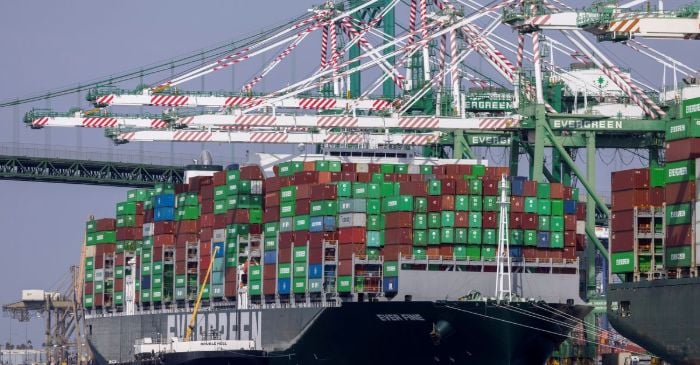DPU incoterm is a trade term that describes a contract where the seller bears the risk of delivering and unloading goods at a chosen location. According to the DPU incoterms rules, the seller must unload the goods to complete delivery.
The information contained in this article was vetted by our experts who are abreast with the new incoterm rules and policies. We know what is required from the buyer and the seller in the DPU incoterm and can help you make an informed decision regarding shipping.
This article sheds light on the meaning of DPU incoterm, its pros & cons, and when to use it, so scroll along!

What is DPU incoterms?
DPU means Delivery at Place Unloaded, it is an international commerce term that was introduced in 2020. It replaces the DAT incoterm, which was initiated in 2010.
Under the DPU incoterm, the seller shoulders the risk of damage until the goods are unloaded. The risk is transferred to the client only when the goods have been unloaded at the chosen location.
The DPU incoterm is peculiar because it is the only rule that requires sellers to unload goods from the arriving means of transport.
Note that the DPU incoterm accommodates all modes of transport. Goods can be transported by sea and inland waterway.
When to use DPU incoterms?

DPU is best suited for consolidated containers, which have multiple consignees, as they will be able to control the unloading process. What’s more, the seller will be able to separate the shipments and prepare them for delivery.
DPU is an excellent option if the items require additional care or are delicate.
What are the Buyers and Sellers’ Responsibilities with DPU incoterms?
Responsibilities of the seller:
- Performing the duties under the “terms of delivery” stated in the contract.
- Unloading goods from the transport means and delivering them at the agreed location.
- I provide the buyer with the documents needed to take over the goods when delivered. And it is a REQUIRED FACTOR in DPU incoterms.
- Acquiring the documents required for import customs formalities, pre-carriage, and transit.
- The seller bears responsibility for transporting the goods.
- Marking export licenses and documentation Export packaging.
Responsibilities of the buyer:
- Inform the seller of the safety requirements of the transported goods.
- Help the seller get the documents critical for transit export.
- Handling the duties cost and any applicable local taxes.
- Payment for goods and preparing documents in the sales contract import formalities.
Suggested reading: Alibaba Payment Failed
Suggested reading: Alibaba DDP Shipping

Pros and Cons of DPU incoterms
Pros:
- Buyers can rest easy knowing that the seller risks damage until the goods are unloaded.
- I have complete control of the transportation and unloading process. Since I am not leaving anything in the hands of a third-party company, I can reduce the odds of damage to the cargo.
- Buyers won’t have to worry about obtaining documents needed to transport and take ownership of the goods.
- The process may help improve the relationship between buyer and seller. Since they will have to share information on licensing and goods handling, they will be able to collaborate better in the future.
Cons:
- Only the buyer bears the cost of import permits, import customs formalities, import security clearance, and taxes. The buyer is also required to pay for any cost incurred because he failed to carry out the obligations that are in the contract.
- Only the seller covers the cost of obtaining the documents needed for transit clearance and export. They also have to pay for the cost of transit and export costs.
A Fast , Easy and Cheap Way to Ship from China
Do not hesitate to contact Leeline Sourcing at any time regarding your shipments from China.
DPU vs DAP
While the DPU (Delivered at Place Unloaded) and the DAP (Delivered a Place) has a lot in common, they aren’t the same. The main difference is what the seller is demanded to do after arriving at the delivery location.
In the case of the DPU, I unload the goods at an agreed location. It is the set LOCATION decided with the buyer already.
The DAP only requires the seller to deliver the cargo to the place chosen by the buyer. The area could be at the buyer’s warehouse, buyer’s depot, transport hub, or business premises.
As mentioned above, the DPU and the DAP have a couple of things in common.
The Sellers bear the cost and the risk of delivering the goods to the buyer. Sellers also provide the various permits required to transport the goods.
DPU incoterms Example
Below is an example that will give you a clearer picture of what DPU incoterm involves.
(Buyer): Peter is a business owner who has a large store that manufactures furniture in Quebec, Canada.
Seller: A reputable manufacturer located in Chengdu, China.
Agreed Term: DPU QUE Terminal, Canada
Duties of the seller; Responsible for arranging carriage and documentation of export packaging. The seller is also responsible for the cost of transport and unloading of the cargo at the QUE terminal, Canada.
Duties of the Buyer; Pay for import clearances and the cargo transportation after it is unloaded at the QUE terminal, Canada.
Point of Risk Transfer; The risk transfers to Peter (buyer) as soon as they are unloaded at the QUE terminal, Canada.

FAQs about DPU
Who pays for what under DPU?
Under the DPU, the buyer pays for acquiring documents linked to import clearance and import formalities. The seller shoulders the delivery cost and the risk of the main carriage.
What does DPU mean in shipping terms?
DPU, which stands for delivered at placed unloaded. Under it, the seller bears all costs and risks of the transported goods (until unloaded).
Is DPU the same as DDU?
The DPU and the DDU are similar, as they mandate the buyer to pay for the cost of import duties, but they aren’t the same. The main difference is that DPU requires the seller to unload the goods.
What’s Next
DPU incoterm is a new rule that requires sellers to shoulder the risk of damage to a cargo until they are unloaded. So, if are a buyer looking to ship delicate goods that require special care the DPU will be perfect for you. Sellers who deliver consolidated containers may also benefit from the DPU.
Are you having issues related to DPU incoterm or shipping? If yes, you should consider visiting our service page. There, you will find the solution you have been seeking.








